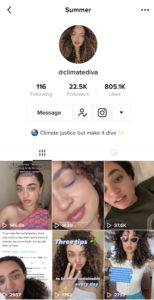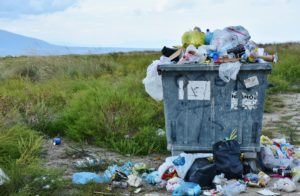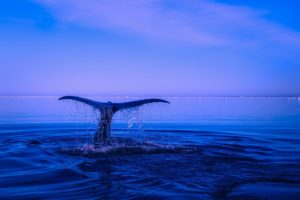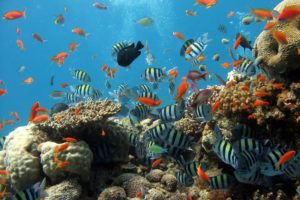Paging Earth is a climate communications blog dedicated to demystifying, depolarizing and educating the public about climate change activism and climate science.
Each week, one of our GCP team members shares the content currently making their world go ‘round.
This week, our University Relations Coordinator, Rachel Blumer, shares their top picks of the week:
Podcast of the week: Force of Nature

Twenty-year-old activist Clover Glove founded Force of Nature to help people understand that they should not feel powerless in the face of climate change. In fact, Glove espouses quite the opposite — she promises to lead you in the direction of becoming a force of nature.
She sits down with trailblazers in the face of climate change, including three-time Nobel Peace Prize winners and the lawyer who helped create the Paris Agreement.
In her most recent episode, I learned about grassroots global movement leader Pam Warhurst, whose new company, Incredible Edible, drives food sovereignty so that no one goes hungry. Listening to the episode, I was inspired by Warhurst’s decision to channel her anger with the current state of politics into motivation to begin a global grassroots movement.
Who’s in my feed: Summer, Climate Diva and Fashionista

Since the pandemic hit, I was one of the people that transitioned from Instagram to TikTok for my social media fix. One of the TikTokers that I have continued to keep up with and follow is Summer (@climatediva), who makes videos showing that you can be adorably fashionable while thinking about the planet.
One of her videos illuminates brands that are environmentally and socially conscious, which are very important amidst fast fashion brands like Shein. Her videos are both educational and humorous, engaging an audience of all ages. Go watch one of her videos and you will be inspired to not only be a climate change warrior but a climate diva!
What I’m reading: How to give up plastic Light, by Will McCallum

One of my favorite environmental books is the novel How to Give Up Plastic by Will McCallum. McCallum asserts that one of the most crucial things we can do is to no longer be a “slave” to single-use plastics.
McCallum tracks the history of plastic use and its integration into our everyday lives to the point where it is almost impossible to go a day without seeing it. He also provides a guide on how to give it up, listing new and intuitive ways to make your home, office, and parties plastic-free through swapping materials with more sustainable and longer-lasting alternatives.
During COVID-19, when disposable face masks can be seen littering the streets, it is important to still think about the environment. Climate change will exist long after this pandemic ceases, and we must remain safe and climate-minded.
Add to your watchlist: Seaspiracy

Seaspiracy has garnered a lot of attention since its Netflix debut on the 24th of March. Though there are definitely some parts that are controversial, the message remains clear: We are depleting our world’s oceans.
The film states that if current fishing trends persist, there will be “no fish left in the sea” by 2048. Several critics claim that the documentary is a mix of conspiracies, but personally, I think that the message is powerful. Commercial fishing today needs to be stopped and it will take the majority of the public to understand the detrimental effects it is having on one of the most vital ecosystems on our planet.
Musician carrying a Message: Flume X GreenPeace

Flume is an artist that I have been listening to for years, but not until recently did I watch his video partnering with Greenpeace. Titled “Flume X Greenpeace,” the video utilizes electrifying beats with the healthy coral reefs then contrasts it to the bleached coral reefs that have been rapidly deteriorating in the past 20 years.
Flume ends the video with messages asking his fans “to do something about it” by donating and declaring that climate change is wrecking the Great Barrier Reef. When musicians, actors, or celebrities that you wouldn’t normally associate with the environmental movement make moves like Flume, it sends a powerful message that anyone can get involved with the movement.
Eye on the arts: Chris Jordan

One of the most groundbreaking environmental artists of our time is photographer Chris Jordan. Based in Seattle, he illuminates the mass consumption in America by taking jaw-dropping photos of just how detrimental the consumer culture in America is to the environment. One image depicts thousands of outdated cellular phones from 2005 that was just mass-produced to be used a little while only to get surpassed as technology advanced.
Jordan has also released a short film, Albatross, set on Midway Island. The island is now a protected island where no human roams, yet thousands of tons of plastic trash wash up there every year from the Floating Garbage Patch.
Every American has been guilty of consumer consumption at least once — just think about how much social media and television tell us we need the next big thing. In fact, I recently just upgraded my iPhone 6 to the iPhone 12 after it had fallen apart at the seams. When I went into the Apple store and showed them my iPhone 6, they were appalled that such an “ancient version” still exists.
This is an excellent example of how the cycle of consumption becomes warped from society’s incessant urges to keep buying and getting the next big thing. All of Jordan’s photographs show the consequences that this vicious cycle has on our environment and how its reach has gone beyond human occupation zones to influence every organism on the planet.






